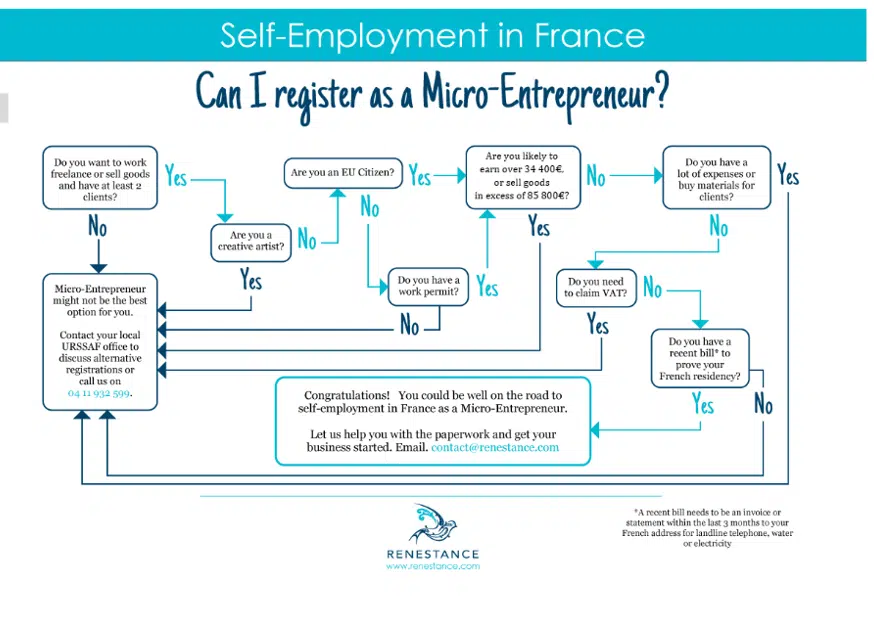Would you like to run your own business in France? Do you want to continue working in your home country remotely? Did you move here to escape the 9-to-5 but still want your own social security number? Do you have a job but have an idea for an exciting side project in France? Registering as a self-employed Micro-Entrepreneur could be your next best move.
French bureaucracy is legendary. Some figures put the portion of the workforce employed by the state at 60% or more, so that’s a lot of paper-pushers. And the paperwork required to start a business can be a minefield. If you’d like to start a business in France, there are many different structures to choose from, depending on how many owners there will be and your estimated income. To register the business and obtain a social security number, the easiest way, by far, is to set up a Micro-Entreprise.
Started in the days of President Sarkozy, the self-employed Micro-Entrepreneur (ME) status (prior to 2016 known as Auto-Entrepreneur) was designed to allow French residents with mid- to low-paying jobs to supplement their income with such things as casual labour, selling goods ranging from homemade crafts to imported costume jewelry, or providing services such as domestic help. Since its creation, the ME status has taken off, and by 2016 there were over 1.1 million registered.
The benefits of ME status over other types of business structures are:
- No need for an accountant
- Streamlined tax and social security filing
- Simplified set-up process.
To be able to register as a ME you need a proof of address in France and a legal work permit. To decide whether ME is right for you, you need to ask yourself a few questions:
What work will you do?
ME status is not appropriate for all lines of work. If it’s an artistic line of work (portrait painter, musician, author, dancer, etc.), or a regulated profession (accountancy, psychology, travel agent, real estate) then ME may not even be an option. Let’s take some pertinent examples:
Trades and businesses you CAN operate as an ME: Chambre d’hôtes, photographer, language teacher, wedding planner, IT advisor, beautician, hairdresser, consultancy.
Professions which CANNOT operate as an ME due to their regulated status: Accountant, lawyer, chiropractician, osteopath, independent salesperson, general works builder, architect, midwife, dietician, financial advisor, real estate agents, developers, finance companies, rental agencies.
Trades and businesses where it would not be cost-effective to be ME: Those where your raw materials costs or overhead would benefit from reclaiming your VAT (not possible with an ME); those requiring paid staff, as you won’t be able to deduct the salary costs directly.
In addition to artists, other types of professions also face restricted eligibility for ME status, like scientific and sports-based activities. The full list of businesses that are non-eligible for this status can be obtained from your local Chambre de Commerce or Chambre des Métiers.
How much will you earn?
Projected turnover, or revenue, has previously been an issue for some businesses – through the end of 2023 there is a VAT free turnover limit of €36,800 for services, and €91,900 for selling goods or materials. This amount of revenue is exempt from Value Added Tax (VAT). If you are looking to exceed these limits, you would be advised to seek professional advice as to whether another business structure would be more suitable in order to charge and recuperate VAT.
| Type of ME business | Maximum turnover for a micro-entreprise | VAT due on turnover from 1st January 2023 |
|---|---|---|
| To the end of 2023 | Turnover not liable to VAT | |
| The buying and selling of merchandise, objects, take-away food, eat-in food, providing housing/accommodation | 188 800 € | 91 900 € |
| Other types of services | 77 700 € | 36 800 € |
Link (in French): https://www.federation-auto-entrepreneur.fr/actualites/tva-auto-entrepreneur-savoir-2022
How much will you spend?
Other key considerations are whether you will incur many operating expenses, such as costs of materials, fuel, staff salaries, and consumables, and whether you’ll have equipment or other large purchases that would need to be amortised. MEs can neither amortise nor deduct costs directly from turnover for income tax purposes, because the regime operates with a flat rate allowance.
For MEs that sell goods or provide housing, 71% of their turnover is deducted for operating costs. So income tax will be calculated on 29% of the turnover.
For MEs that provide services, 50% of their turnover is deducted for operating expenses, so income tax is calculated on half of the turnover amount.
So if the costs to run your business would amount to more than 71% or 50% of your revenues, as applicable, the ME regime may not be the best one to choose.
Do you need health coverage, pension, and other social benefits?
One of the main advantages of this regime, compared to the classic regime, is that the owner is immediately covered for health and social benefits without having to pay provisional social charges. If no revenue is collected for the period, no social charges are paid.
For MEs selling goods or providing unfurnished housing, the social charges are 12.3% of turnover collected (not simply billed).
For MEs providing services or furnished housing, the rate is 21.2%.
French social security covers you for up to two years without any collected revenue, so there is virtually no risk in trying out your business idea as a self-employed micro-entrepreneur.
Do you need an accountant?
Lastly, another huge benefit of the ME status over other self-employment regimes in France is its simplicity. Not only are the income tax and social charges calculations based on flat rates, Micro-Entreprises’ accounting is much more straightforward, and therefore no accountant is required.
Does this all sound a bit confusing? It certainly can be, especially when going through the process in a foreign language!
Take a look at our flowchart to find out if self-employed micro-entrepreneur status is right for you:
Bottom line
If you are not sure how your business will take off, registering as an ME will cost you nothing. Even if your sales are zero for a couple of years, you are still officially ‘in business’ with all the benefits that the ME status offers, including healthcare.
We can help you through the whole process by explaining, completing the paperwork, working the systems, and following up until you’re ready to go. We even provide a guide to running the administrative side of your ME, so there is no guesswork going forward. No matter how complex your application may seem, we can negotiate on your behalf to make sure nothing gets lost in translation or stuck in the system!
Renestance has already helped many budding entrepreneurs set up their first ME – translators, bed and breakfast owners, wedding planners, internet businesses – can we help you too? Send an email to inquiries@renestance.com if you would like further information.
Source: https://entreprendre.service-public.fr/vosdroits/F23267
You might also be interested in…
Dennelle is the President of Renestance and a bilingual American who’s lived in France since 2000. She loves so many things about France, its language, culture, geography, quality of life... that she started a business to help others realize their dreams of living in this incredible place.
All articles by: Dennelle Taylor Nizoux








